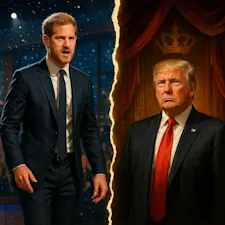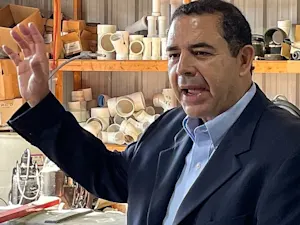
El Salvador's President Has a Nickname for Trump
Nayib Bukele's 2025 meeting with Donald Trump. Photo courtesy of r Casa Presidencial El Salvador. Public domain.
It wasn't just the handshake that got people talking. When El Salvador's president Nayib Bukele strolled into the White House on Monday to meet with U.S. President Donald Trump, the buzz wasn't about standard statecraft — it was about a deal that could send violent criminals, including some born in the United States, to a foreign mega-prison.
And the Salvadoran leader? He's not just going along for the ride. Bukele and Trump seem to be close, not just politically but personally. They even have nicknames for each other.
Who Is Nayib Bukele?
To understand what brought Bukele to Washington, you have to know who he is — and why he's one of the most polarizing figures in the Western Hemisphere.
Elected in 2019, Bukele rose to power, campaigning against corruption and promising a new era of order. By 2022, he had declared a nationwide state of emergency to crack down on gangs, a move that's still in place three years later. More than 85,000 people have been arrested, but only a fraction — around 1,000 — have been convicted of crimes.
Critics call him an authoritarian. Supporters call him a savior. He calls himself the "world's coolest dictator", according to NPR.
At 43, Bukele is one of Latin America's youngest heads of state. With his backward baseball cap, slick social media presence, and sky-high domestic approval ratings, he's carved out an identity as a populist strongman for the digital age. And he's been reelected in a landslide — a rare feat in El Salvador's constitutional history.
Why the White House Rolled Out the Red Carpet
Bukele wasn't in Washington just for ceremony. He was there to talk business — or, more precisely, about prison space and deportation policy.
Since March, El Salvador has accepted over 200 Venezuelan immigrants from the U.S., many of whom Trump administration officials claim are gang members — accusations critics say lack public evidence. The deportees are being held at El Salvador's infamous mega-prison, the Terrorism Confinement Center (CECOT), outside the capital.
And the deal is more than symbolic. The Trump administration is paying Bukele's government $6 million to detain the migrants for one year.
Trump's New Deportation Gambit
In a move that raised both legal eyebrows and political cheers, Trump is now openly considering sending American-born violent criminals to El Salvador as well — if it can be done legally.
According to ABC News, Trump told reporters, "I'm all for it. If it's a homegrown criminal, I have no problem. Now we're studying the laws right now... If we can do that, that's good."
Legal experts have called the idea unconstitutional. But Trump's team says only the most "heinous" repeat offenders would be sent, according to Time.
Bukele, sitting beside Trump, didn't say no. What he did say, however, left little room for negotiation on one high-profile case.
The Case of Kilmar Abrego Garcia
Abrego Garcia, a Maryland resident and Salvadoran citizen, was deported despite a 2019 court order blocking his removal. The Supreme Court ruled earlier this month that his deportation was illegal and ordered the administration to help return him.
But Bukele isn't budging.
"I don't have the power to return him to the United States," Bukele said in the Oval Office, according to ABC News. "How could I smuggle a terrorist into the United States?" he added — repeating the administration's claim, unproven in court, that Abrego Garcia is a gang-affiliated terrorist.
Abrego's attorneys have denied all gang affiliations. He has not been charged with any crime in the U.S.
A Controversial Alliance
Bukele's full-throttle embrace of Trump's immigration crackdown has made him a darling among MAGA loyalists. According to Time, U.S. Secretary of State Marco Rubio said that Bukele "has really been a good friend to the United States in that regard. These are some of the worst people you'll ever encounter," referring to the alleged MS-13 and Tren de Aragua gang members.
But human rights organizations warn that El Salvador's mega-prison is notorious for harsh conditions, limited oversight, and allegations of abuse. Some critics go further, labeling the current deportation wave as "forced disappearances," as reported by NPR.
Still, Trump and Bukele's partnership seems only to be growing. Last week, Trump's Truth Social post praising "President B" for accepting "some of the most violent alien enemies of the world" was quickly shared by Bukele himself.
Bukele tweeted: "I miss you already, President T" — a clear sign of mutual admiration.
What Comes Next?
The future of the Trump-Bukele alliance remains murky — and legally fraught. The Supreme Court has allowed deportations under the 1798 Alien Enemies Act but insists that each deportee gets a court hearing. Meanwhile, Trump and Bukele are testing how far executive powers can stretch in both countries.
And if Bukele has his way, "President B and President T" may not be done reshaping law and order.
References: El Salvador's Bukele after friendly White House meeting with Trump: 'I miss you already, President T' | What to Know About El Salvador President and Trump Ally Nayib Bukele as He Visits U.S. | The 'world's coolest dictator' heads to the White House | El Salvador's Bukele, meeting with Trump, says he won't return migrant wrongfully deported






















